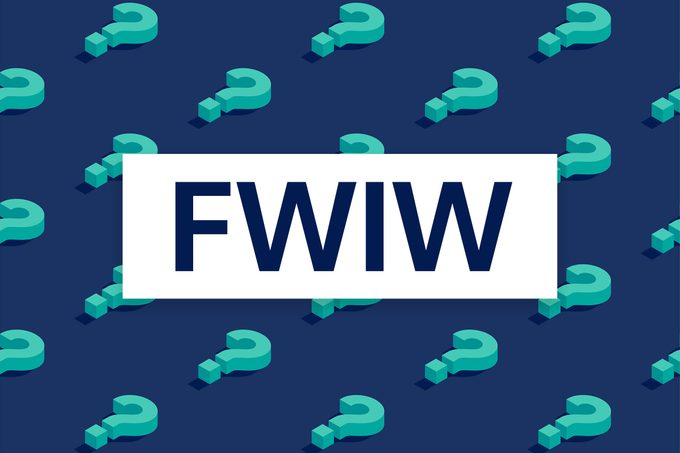This unusual-looking abbreviation will never slow you down again

What Does “FWIW” Mean?

Like many texting abbreviations, FWIW isn’t easy to figure out the first time you see it. And depending on who sends it, you might not want to ask them what it means. Cue the inevitable mental calculation of what each letter might stand for: For whatever I wish? For whenever I want? Five wizards in wardrobe? Eventually, you end up asking the question, “What does FWIW mean?”
Luckily, we have the answer. Read on to find out what FWIW means, the history behind the abbreviation and when to use this slang term.
Get Reader’s Digest’s Read Up newsletter for more grammar, humor, travel, tech and fun facts all week long.
What does FWIW mean?
FWIW means “for what it’s worth.” It usually comes at the beginning of a sentence to suggest you’re providing personal views. Think of it like saying, “You can take this or leave it, but here’s my opinion.” In that sense, the FWIW meaning is similar to “in my opinion,” just a bit stronger.
FWIW’s meaning is like a mix between “in my opinion” and “for your information” with a dash of “take this with a grain of salt.” You can use it to present an opinion gently, add context to discussions or preface a relevant point. But you can also use FWIW to add snark to a statement (more on that later).
What is the history behind FWIW?
As with most internet slang definitions, FWIW originally had a different meaning. When purchasing land or livestock, buyers would offer to pay “for what it’s worth,” meaning the amount they believed an item was truly valued at.
Eventually, however, that original meaning got a more subjective—and sarcastic—twist. An early example of this from literature is in William Henry Oxberry’s 1844 play, Newton Foster, or the Merchant Service. In it, one character says to another, “Consequently, your opinion goes for what it’s worth—nothing.”
So how did the phrase for what it’s worth end up abbreviated in your text thread? As far as linguists can tell, the earliest use of FWIW was in the 1980s. The Oxford English Dictionary points to 1986, in particular, in Re: UNIX v.3 Query.
It took decades for the modern use made its way into the dictionary, though. In fact, Merriam-Webster didn’t add the word to its dictionary until September 2022.
How do you use FWIW?

More often than not, people use the abbreviation FWIW when they want to emphasize a point or politely disagree.
Let’s say you and a friend are having a debate over text about who the greatest living actress is. Your pick is Viola Davis, but your friend disagrees. “FWIW,” she writes, “Meryl Streep has won more Oscars.”
You and your friend aren’t suddenly feuding. She’s just bringing up something that you may or may not want to consider. (You could reply, “FWIW, Viola Davis is an EGOT winner.”)
How should you not use the term?
As we saw with our literary example, FWIW can come off as snide or dismissive. You’ll want to avoid this slang term in certain situations, especially professional ones.
To avoid sounding sarcastic, pay attention to what you say right after FWIW. You’ll want to make sure that the next part is truly your subjective opinion or, at least, not an obvious fact. When you use FWIW meaning to be informative, the information you relay should be new or nonintuitive. Otherwise, you’re “reminding” someone of something they should already know, which can easily be interpreted as condescending.
Why trust us
At Reader’s Digest, we’re committed to producing high-quality content by writers with expertise and experience in their field in consultation with relevant, qualified experts. We rely on reputable primary sources, including government and professional organizations and academic institutions as well as our writers’ personal experiences where appropriate. We verify all facts and data, back them with credible sourcing and revisit them over time to ensure they remain accurate and up to date. Read more about our team, our contributors and our editorial policies.
Sources:
- Oxberry’s Budget of Plays: “Newton Foster, or The Merchant Service”
- Oxford English Dictionary: “FWIW”
- Merriam-Webster: “We Added 370 New Words to the Dictionary for September 2022”






















